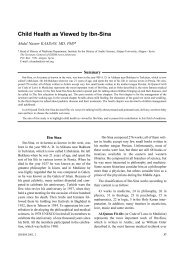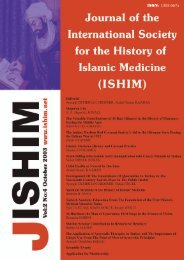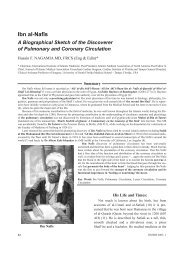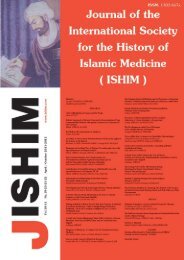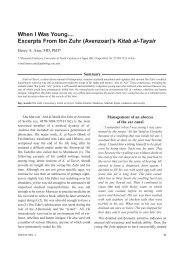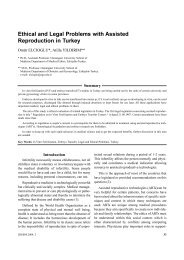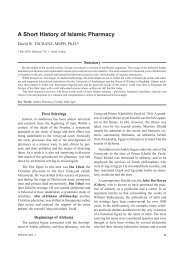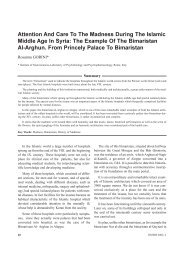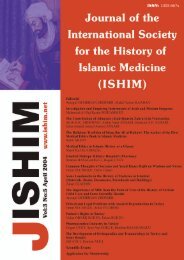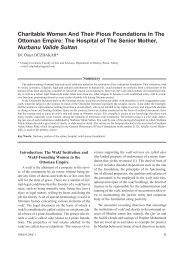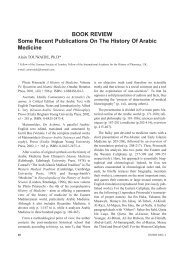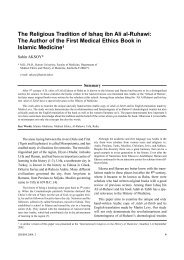Journal - International Society for the History of Islamic Medicine
Journal - International Society for the History of Islamic Medicine
Journal - International Society for the History of Islamic Medicine
You also want an ePaper? Increase the reach of your titles
YUMPU automatically turns print PDFs into web optimized ePapers that Google loves.
Medical Ethics in Medieval Islam*<br />
Plinio PRIORESCHI*<br />
* MD, PhD, Department <strong>of</strong> Pharmacology, Section <strong>of</strong> <strong>History</strong> <strong>of</strong> <strong>Medicine</strong>, School <strong>of</strong> <strong>Medicine</strong>, Creighton University, Omaba,<br />
Nebraska 68178, USA<br />
e-mail: plinio@creighton.edu<br />
As we have seen elsewhere (1), society confers on<br />
<strong>the</strong> physician special trust and privileges (e.g.,<br />
knowledge <strong>of</strong> confidential in<strong>for</strong>mation, examination<br />
<strong>of</strong> <strong>the</strong> most intimate parts <strong>of</strong> <strong>the</strong> body), but it requires<br />
in return that he adhere to principles <strong>of</strong> behavior<br />
expressed in codes which are common to many cultures.<br />
In <strong>the</strong> Western World, such a code was (and, to<br />
a certain extent, still is) (2) <strong>the</strong> Hippocratic Oath.<br />
The <strong>Islamic</strong> world was no exception and treatises<br />
<strong>of</strong> medical ethics were common. (2) The <strong>Islamic</strong><br />
physician also recognized <strong>the</strong> validity <strong>of</strong> <strong>the</strong><br />
Hippocratic Oath, which was translated and adapted<br />
to <strong>the</strong> <strong>Islamic</strong> religion (in <strong>the</strong> same way it was modified<br />
in <strong>the</strong> West to reconcile it with Christianity (3)).<br />
The Arabic version <strong>of</strong> Usaybia reads:<br />
I swear by God, Master <strong>of</strong> life and death, giver <strong>of</strong><br />
health and creator <strong>of</strong> healing and every cure, and I<br />
swear by Asclepius, and I swear by all God’s saints,<br />
male and female, and I call on all <strong>of</strong> <strong>the</strong>m as witnesses<br />
that I will fulfil this oath and this condition.<br />
I believe that he who instructs me in this sciences<br />
takes <strong>the</strong> place <strong>of</strong> my fa<strong>the</strong>rs. I will let him share in<br />
my livelihood and, should he need money, I will give<br />
it to him and let him participate in my income. I will<br />
consider <strong>the</strong> generation <strong>of</strong> his descendants as equal to<br />
my bro<strong>the</strong>rs and I will instruct <strong>the</strong>m in this science,<br />
should <strong>the</strong>y need to learn it, without payment and<br />
without condition. I will allow my children and my<br />
teacher’s children and <strong>the</strong> pupils who have accepted<br />
Summary<br />
The author discusses medical deontology in medieval Islam. After reviewing <strong>the</strong> work <strong>of</strong> al-Ruhawi and o<strong>the</strong>r <strong>Islamic</strong> ethicists,<br />
he notes that in medical ethics, as in medicine and o<strong>the</strong>r sciences, <strong>Islamic</strong> civilization, at <strong>the</strong> time, reached levels unsurpassed anywhere.<br />
Key Words; <strong>Islamic</strong> Civilization, Ethicists, Medieval Islam.<br />
this condition and are sworn to <strong>the</strong> medical nomos (1)<br />
to participate toge<strong>the</strong>r in exhortations and learning<br />
and all that has to do with <strong>the</strong> science, but <strong>for</strong> nobody<br />
else will I do so.<br />
During <strong>the</strong> entire treatment, I will strive, as far as it<br />
is possible <strong>for</strong> me, to benefit patients. Things that may<br />
harm <strong>the</strong>m and do <strong>the</strong>m wrong I will avoid to <strong>the</strong> best<br />
<strong>of</strong> my judgment. I will not give a lethal medicine if<br />
asked <strong>for</strong> it nor give such counsel. Similarly, I do not<br />
believe that I may give women an injection [i.e., give<br />
a drug or per<strong>for</strong>m a procedure] to induce abortion. In<br />
my treatment and my science I will keep myself pure<br />
and clean. Also, I will not make an incision <strong>for</strong> someone<br />
who has a stone in his bladder, but will leave it to<br />
those who per<strong>for</strong>m this operation pr<strong>of</strong>essionally.<br />
All <strong>the</strong> houses that I enter, I will enter <strong>for</strong> <strong>the</strong> benefit<br />
<strong>of</strong> patients, being in a condition far removed from<br />
injustice, wickedness and voluntary and deliberate<br />
corruption in general as well as in respect <strong>of</strong> sexual<br />
intercourse with women and men whe<strong>the</strong>r free or<br />
slaves. Things concerning people’s activity which I<br />
observe or hear during <strong>the</strong> treatment <strong>of</strong> patients and<br />
at o<strong>the</strong>r times and which ought not to be discussed<br />
outside I will avoid, since I believe that one should<br />
not talk about such matters.<br />
He who keeps this oath and does not corrupt it in<br />
any respect will be privileged to perfect his treatment<br />
and his science most excellently and beautifully and<br />
will be constantly praised by all men in future. The<br />
44 JISHIM 2004, 3



